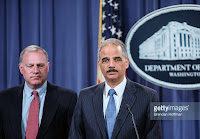Columnist
Jim Cameron in the Stamford Advocate has curtly written off Governor Dannel Malloy: “Our governor is a lame duck.
Because he’s announced he’s not running for re-election, he has the political
clout of a used teabag. And even though he’s our state’s leader for another 11
months, nobody cares about him or his ideas any longer.”
Malloy’s Lieutenant Governor, Nancy Wyman, has decided she
would rather be spending time with her family than running for governor, which
would necessarily entail a hearty defense of Malloy’s ruinous policies.
After two terms making Connecticut great again, Malloy
himself has decided to take a hike.
Attorney General George Jepsen, whose time in office was
spent avoiding media notoriety -- unlike his predecessor, former Attorney
General Dick Blumenthal, for whom fawning media attention was the River Styx in
which he bathed frequently – has called it a day after two terms as
Connecticut’s AG. And no, the former Chairman of the State Democratic Party has
no plans to run for governor. Both Blumenthal and former Attorney General Joe
Lieberman used the AG’s office as springboard to a U.S. Senate sinecure.
Mayor of Hartford Luke Bronin, once Malloy’s Chief Council,
having said he would need a couple of terms in office to turn the U.S.S.
Hartford around, has rushed into the vacuum created by Malloy’s departure. Connecticut’s Capital City is taking on
water. Only a few weeks ago, Bronin was palavering with lawyers about a
bankruptcy declaration, and if he now feels the governor’s office is a politically
safe haven compared to the mayoralty of Hartford, he’s one bright cookie. Most
lawyers are not dummies, despite the usual bad rap on the comic circuit. Question:
What do you call a lawyer with an I. Q. of 50? Answer: Your honor.
An open Democrat gubernatorial field has yanked Ned Lamont
from the shadows. Lamont, a cable millionaire and great-grandson of Chairman of
J.P. Morgan & Co. Thomas Lamont, successfully challenged then U.S. Senator
Joe Lieberman in a Democrat primary; he then lost to Lieberman, who successfully defended his seat as an independent in a general election. “Lamont spent $26
million of his cable television fortune on his run for the Senate and for
governor,” Neil Vigdor of CTPost reminds us, and Lamont was, of course,
supported by former U.S. Senator Lowell Weicker, who is still recovering from
his 1988 loss to Lieberman.
“I just care about whether I think I can make a difference
and get this state back on track,” Lamont said. “We’ve got so many amazing
assets. We’re just not making the best out of our potential.” Lamont indicated
he would decide by January whether he would throw his hat into the
gubernatorial ring. By that time, the floor on both sides of the political
barracks will be littered with hats.
These bow-outs of Malloy, Wyman and Jepsen have kicked the
doors open on an election that promises to be alarmingly interesting. If anyone
wants to know how term limits might introduce into Connecticut’s sclerotic
political system the verve and energy of a new day, they have only to look
about them. Had term limits been in force midway between Dick Blumenthal’s
agonizingly long twenty year term as the state’s Attorney General he might have
been a U.S. Senator or possibly a Governor more than ten years earlier; for it is not true that term
limits would end political careers. They would simply move the pieces on the
political chess board towards different political functions. PAC committees,
easily captured by incumbents, would have to decide, upon a governor or a
senator leaving his post, who they might want to corrupt in the future; in the
absence of a healthy turn-over in various offices, corruption has become routine, predictable and automatic.
Term limits would invigorate political parties, and awaken all the nerve
tingling juices of reporters during election cycles.
This is precisely what is happening right now that three
prominent office holders have decided in effect to term limit themselves.
Jepsen’s political career has been well rounded: In 2018, he
will have put in 8 years as Attorney General. But Jepsen also served in the
State House for 4 years and the State Senate for 12 years. He served as
Chairman of the Democratic Party for 2 years. These terms in different political
offices approximate term limit spans. Jepsen circulated himself through a now
sclerotic political system, and no one is complaining that the State Senate,
for example, has been irreparably damaged because Jepsen did not spend as much
time there as Blumenthal had in the Attorney General’s office.
Had term limits been in operation for the last few election
cycles, no one in the Democratic Party would be wincing at the prospect that a Bridgeport mayor who spent years in prison for corruption might become the next Governor
of Connecticut. The gubernatorial field on the Democratic side would now be
crowded with recirculated Democrats, some of whom just might be able to pull
Connecticut out of its progressive mire by its former moderate and pragmatic
bootstraps.

Comments